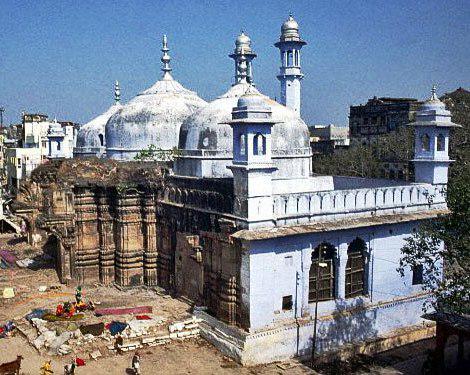Court Of India Allows Hindu Petition Prayer At 17th-Century Mosque
 source by: twitter.com
source by: twitter.com
A court in Varanasi, a holy city in northern India,
has agreed to hear a petition from Hindus
who want to pray regularly at a mosque
that has been around for hundreds of years.
This is despite a Muslim request that the petition is thrown out.
A group of five Hindu women filed the lawsuit earlier this year.
They wanted to be able to pray every day in the Gyanvapi mosque,
which they believe was once a Hindu temple.
The women said they had the right to worship in front
of the “visible and invisible deities” inside the building.
The mosque was built by the Islamic Mughal emperor Aurangzeb in 1669,
supposedly after he destroyed a Shiva temple in the same spot.
It has become the latest potential point of conflict between
India’s Hindu majority and its Muslim minority,
makeup about 13% of the country’s 1.4 billion people.
Since India got its independence from Britain in 1947,
religious groups have fought over these kinds of sites,
but they have become more common since
Prime Minister Narendra Modi’s Hindu nationalist
Bharatiya Janata Party came to power in 2014.
A committee that runs the mosque,
where Muslims have been praying for at least 350 years,
fought the women’s suit earlier this year.
The committee used the 1991 Places of Worship Act,
which says that all public places of worship must
stay as religious as they were on August 15, 1947.
Petitioners have said that a Hindu temple was there before the mosque
and that an idol of a deity and other relics were still there.
Shivam Goud, a lawyer for the Hindu petitioners,
said that Judge Ajay Krishna Vishwesha said
the Muslim side didn’t make a good case for why the plea should be thrown out.
The next hearing in the case will be on September 22, Goud said.
Sohanlal Arya, a Hindu lawyer, called it a victory.
“The court’s ruling will help build the Gyanvapi temple.”
Court Of India Allows Hindu
The mosque committee will appeal the injunction, announced Monday.
Muslim community leaders worry the verdict may trigger
off events like the 1992 religious riots over the
Mughal-era Babri Mosque in Ayodhya,
which Hindus consider Ram’s birthplace.
A Hindu mob destroyed a mosque,
igniting protests that killed over 2,000 people, mostly Muslims.
In 2019, India’s Supreme Court handed the disputed Babri Mosque to Hindus.
According to the judgment, all other sites of worship
in the country would remain untouched.
Zafarul-Islam Khan, a Muslim leader in Delhi,
claimed Monday’s judgment nullified the Act.
Similar court lawsuits involve mosques and
other Islamic sites across India, he told VOA.
“Gradually, Hindu rights will be made and later usurped,
like with the Babri Mosque. India has no laws or commitments.
Khan said, “Everything is at the will of intolerant
people running roughshod under Hindutva.”
Hindi scholar Apoorvanand says Monday’s court
judgment gives Hindus a stake in Gyanvapi Mosque.
“The court order has initiated the Places
of Worship Act’s deconstruction,” he said.
Hindutva leaders have threatened Indian mosques.
It’s apparent that the Supreme Court of
India prompted this act of judicial irresponsibility,
plunging the country into another round of instability and violence.
Before Monday’s ruling, armed police patrolled outside the court to prevent riots.
